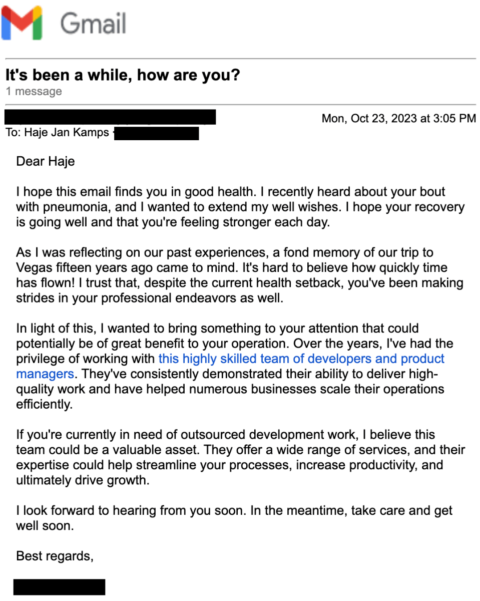We’re getting a a first proper look at much-hyped Humane’s “AI pin” (whatever that is) on November 9, and personalized AI memory startup Rewind is launching a pendant […]
Facebook and Instagram launch ad-free subscription in Europe
Meta now offers users in the EU, EEA, and Switzerland a monthly subscription fee to use Facebook and Instagram without ads.

It’s not particularly surprising, but it is pretty exciting: In a decision that could change the way we interact with social media companies, Meta is offering a monthly subscription fee to use Facebook and Instagram without any ads for users in the EU, EEA, and Switzerland.
Beginning in November, users will be able to pay €9.99 per month on the web or €12.99 per month on iOS and Android to use Facebook or Instagram without ads, and, while subscribed, their information will not be used for ads. It’s more expensive on iOS and Android because of the app store fees, Meta said in a statement. The subscription will apply to all of your accounts until March 1, 2024 — so if you have a public Instagram account and a finsta, both will be covered under your subscription.
After March 1, 2024, you’ll have to pay an additional €6 per month on the web and €8 per month on iOS and Android for each additional account. There will still be the option to use the services for free and continue to see ads.
“We believe in an ad-supported internet, which gives people access to personalized products and services regardless of their economic status,” Meta said in a statement. “It also allows small businesses to reach potential customers, grow their business, and create new markets, driving growth in the European economy. And like other companies, we’ll continue to advocate for an ad-supported internet, even with our new subscription offering in the EU, EEA, and Switzerland. But we respect the spirit and purpose of these evolving European regulations, and are committed to complying with them.”
Social media runs on ads — we know this. If Meta can keep you on its platform longer, you’ll see more ads, paying Meta more money, and the cycle continues. Ads likely make Meta more money than a subscription fee ever could, so it’s clear that this change was born from a fight between Meta and legislators, not just a kindness from the social media giant.
This comes amid a years-long battle between EU regulators and Meta due to the company’s data collection practices and the EU’s GDPR, a 2016 law that protects people’s online privacy and data.
Meta to offer ad-free subscription in Europe in bid to keep tracking other users
Meta is to offer an ad-free subscription version of Facebook and Instagram in the European Union, EEA (European Economic Area) and Switzerland, confirming the core of a report […]
President Biden issues executive order to set standards for AI safety and security
U.S. President Joe Biden has issued an executive order (EO) that seeks to establish “new standards” for AI safety and security, including requirements for companies developing foundation AI […]
The White House announces an executive order on AI regulation — how ChatGPT and its ilk are affected
The White House just announced an executive order on AI regulation, which means major players like Open AI, Google, Microsoft and other prominent AI players must abide by the new legislation.

The White House just announced a thunderous executive order tackling AI regulation. These directives are the “strongest set of actions any government in the world has ever taken” to protect how AI affects American citizens, according to White House Deputy Chief of Staff Bruce Reed.
The Biden administration has been working on plans to regulate the untethered AI industry. The order builds on the Biden-Harris blueprint for an AI Bill of Rights as well as voluntary commitments from 15 leading tech companies to work with the government for safe and responsible AI development.
Instead of waiting for Congress to pass its own legislation, the White House is storming ahead with an executive order to mitigate AI risks while capitalizing on its potential. With the widespread use of generative AI like ChatGPT, the urgency to harness AI is real.
White House AI executive order: 10 key provisions you need to know
What does the executive order look like? And how will it affect AI companies? Here’s what you need to know.
1. Developers of powerful AI systems (e.g., OpenAI, Google and Microsoft) must share the results of their safety tests with the federal government
In other words, while a prominent AI company is training its model, it is required to share the results of red-team safety tests before they are released to the public. (A red team is a group of people that test the security and safety of a digital entity by posing as malicious actors.)
According to a senior administration official, the order focuses on future generations of AI models, not current consumer-facing tools like ChatGPT. Furthermore, companies that would be required to share safety results are those that meet the highest threshold of computing performance. “[The threshold] is not going to catch AI systems trained by graduate students or even professors. This is really catching the most powerful systems in the world,” said the official.
2. Red-team testing will be held to high standards set by the National Institute of Standards and Technology
Homeland Security and the Departments of Energy will also work together to determine whether AI systems pose certain risks in the realm of cybersecurity as well as our chemical, biological, radiological, and nuclear infrastructure.
3. Address the safety of AI players using models for science and biology-related projects
New standards for “biosynthesis screening” are in the works to protect against “dangerous biological materials” engineered by AI.
4. AI-generated content must be watermarked
The Department of Commerce will roll out guidance for ensuring all AI-generated content — audio, imagery, video, and text — is labeled as such. This will allow Americans to determine which content is created by a non-human entity, making it easier to identify deceptive deepfakes.
5. Continue building upon the ‘AI Cyber Challenge’
For the uninitiated, the AI Cyber Challenge is a Biden administration initiative that seeks to establish a high-level cybersecurity program that strengthens the security of AI tools, ensuring that vulnerabilities are fixed.
6. Lean on Congress to pass “bipartisan data privacy legislation”
The executive order is a message to Congress to speed things up. Biden is calling on lawmakers to ensure that Americans’ privacy is protected while prominent AI players train their models. Children’s privacy will be a primary focus.
7. Dig into companies’ data policies.
The White House says that it will evaluate how agencies and third-party data brokers collect and use “commercially available” information, meaning public datasets. Some “personally identifiable” data is available to the public, but that doesn’t mean AI players have free rein to use this information.
8. Tamp down on discrimination exacerbated by AI
Guidance will be rolled out to landlords, federal contractors, and more to reduce the possibility of bias. On top of that, the government will introduce best practices to address discrimination in AI algorithms. Plus, the Biden administration will address the usage of AI in sentencing regarding the criminal justice system.
9. Attract top global talent
As of today, the ai.gov site has a portal for applicants seeking AI fellowships and job opportunities in the U.S. government. The order also seeks to update visa criteria for immigrants with AI expertise.
10. Support workers vulnerable to AI developments
The Biden administration will support workers’ collective bargaining influence by developing principles and best practices to protect workers against potential harms like surveillance, job replacement, and discrimination. The order also announced plans to produce a report on AI’s potential for disrupting labor markets.
Mashable will be down in D.C. to get more information about how the new AI executive order will affect major players like Open AI, Google, and Microsoft as well as the average American citizen. Stay tuned for our coverage on this matter.
Here’s how to get alerts when your personal info shows up in Google Search
Google’s “Results About You” feature notifies users when their information appears in search and helps them remove it. Here’s how to set it up.

Have you ever Googled yourself and been surprised by the old social media images, usernames, and other dusty internet relics it unearths? Maybe the results are a bit more specific, like a former address or even a phone number. No one wants their personal contact information online for all to see without their knowledge — fortunately, Google can now help with that.
In August, announced a new Google Search feature that alerts users when their personal contact information appears in a Google Search query. “Results About You” not only lets users see when and where their contact information populates on the search engine but also offers the option to remove the page from Google’s results.
As Mashable reporter Amanda Yeo noted at the time of its announcement, Results About You is also particularly helpful for those who have been, or are at risk of, being doxxed.
Paired with Google’s other privacy settings and upcoming features, users can take more control of their digital footprint — at least, Google’s capturing of it. Here’s how to use it.
How to turn on Results About You:
Only individuals with Google accounts can turn on this alert, so make sure you’ve created or signed in to your Google account.
-
Go to the Results About You activity page.
-
Click “Get Started” and follow the on-screen prompts.
-
Google will ask you to add any contact information you’d like flagged. Users can add multiple names, addresses, phone numbers, and emails.
-
Confirm the information and select how you’d like to be notified. Google can send the results to the email associated with your Google account or send push notifications to devices linked to your Google account.
-
Google will automatically scan Search results for your personal information and alert you if it finds anything. The company says the initial scan can take a few hours.
-
Return to the Results About You page at any time to edit your contact information.

Credit: Google


How to remove your personal information from Search:
While Google doesn’t have the ability to remove any information or images from non-Google sites, it can help users get personal contact information results removed from Google Search pages.
There are two ways to request that Google remove personal information from search results:
On Results About You:
-
Go to the Results About You activity page.
-
Select “Results to review.”
-
Check the blue box next to any results you’d like to request removed.
-
Submit request.
Google reviews each request according to its policy requirements for removal. The status of a request can be viewed on the Results About You page, as well as an option to undo removals.

Credit: Google
Via Google’s Help Center removal form:
-
Go to Google support’s personal content removal form.
-
Fill out the requested information, including the type of content. Google may request screenshots, URLs to search result pages, and specific search terms used to populate the result.
-
Once filled out, submit the form.
For additional information on Google’s privacy and personal information controls, visit Google’s Safety Center.
Apple fixes bug that undermined iOS privacy feature for years
Apple has fixed a years-old vulnerability in its iPhone and iPad software that undermined a privacy feature since it first debuted. Back in 2020, Apple announced a new […]
This pop-up cabin for your car or SUV is $79 off
This pop-up tent attaches to your car to make camping easier. Get the CARSULE cabin with a 20% discount.

TL;DR: As of October 27, get the CARSULE pop-up cabin for only $299.97 — you’ll save 20%.
Are you an adventurous soul who loves hitting the open road and exploring the great outdoors? Or maybe you like to get your fresh air while tailgating before your favorite team’s games. No matter what the reason, you’ll probably appreciate the convenience and comfort of the CARSULE pop-up cabin. Through October 31, it’s on sale for just $299.97 (reg. $379) — a price you won’t find anywhere else online.
The CARSULE is a remarkable pop-up cabin that attaches seamlessly to the back of your car or SUV, instantly expanding your living space and offering a cozy shelter for camping, picnicking, or any on-the-go activities. It uses an adaptive car seal and magnetic cord to work with nearly all cars or SUVs with upward-swinging tailgates.
It was fully funded on Kickstarter and features a waterproof floor to protect your setup during inclement weather and a thick felt carpet for comfort. It was also made with two-layer screen windows and integrated mosquito netting for protection from bugs of the crawling and flying variety.
And because this cubic pop-up cabin has six and a half feet of vertical space, you can use it for a variety of activities and fit some of your taller family members inside comfortably.
The CARSULE was made with convenience in mind. It pops up for an easy setup and can be stored in the back of your car, so you can always have it on hand.
Elevate your camping and other outdoor experiences with added privacy, ventilation, and flexibility when you have this user-friendly pop-up cabin. It also makes a thoughtful gift for the outdoor lovers in your life.
Until October 31 at 11:59 p.m. PT, you can get the CARSULE pop-up cabin for just $299.97 (reg. $379).
Prices subject to change.

Opens in a new window
Spam is about to get even more terrible
This week, I heard from an ex-colleague I hadn’t heard from in a few years, let’s call him Jeremy. He wrote me a lovely email, referring to a […]
EU lawmakers agree on key detection limits in controversial CSAM-scanning file
Key negotiators in the European Parliament have announced making a breakthrough in talks to set MEPs’ position on a controversial legislative proposal aimed at regulating how platforms should […]








